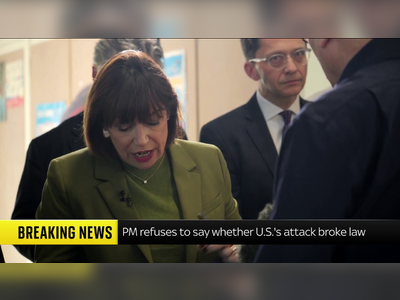
MEPs push to bring chatbots in line with EU's fundamental rights
MEPs want chatbots to include safeguards that will prevent them from generating content that is illegal under EU law.
Members of the European Parliament overwhelmingly voted on Thursday morning to advance a draft regulation to ensure the "ethical development" of Artificial Intelligence (AI), a rapidly evolving technology that has raised concerns about disinformation, privacy, surveillance, discrimination, plagiarism, impersonation and even the future of democracy.
With the new EU-wide rules, lawmakers want to guarantee AI systems are "overseen by people, are safe, transparent, traceable, non-discriminatory and environmentally friendly," said a press release.
MEPs "also want to have a uniform definition for AI designed to be technology-neutral, so that it can apply to the AI systems of today and tomorrow."
The vote, which took place in a joint session of the internal market and civil liberties committees, added new provisions to the original text proposed by the European Commission, most notably fresh obligations on so-called generative foundation models, like ChatGPT, the chatbot developed by OpenAI that has revolutionised the tech industry since its launch in late November.
Foundation models are those trained with vast troves of data, such as text, images, music, speech and code, with the goal of fulfilling a wide and ever-changing set of tasks, rather than having a specific, unmodifiable purpose. Chatbots like OpenAI's GPT and Google's BERT are some of the early examples of this technology, which is expected to further evolve in the coming years.
While investors have jumped fast on chatbots, critics have decried their unchecked development, raising the alarm about bias, hate speech, fake news, state propaganda, IP violations, labour redundancies, cyberattacks and the increasingly blurred line between human and artificial.
Mindful of the growing concerns, lawmakers have added amendments to ensure chatbots are transparent, do not produce content that is illegal under EU law, comply with copyright rules and respect fundamental rights like freedom of expression.
"Generative foundation models should ensure transparency about the fact the content is generated by an AI system, not by humans," the new text reads.
MEPs also pushed to broaden the list of "intrusive and discriminatory" AI applications that should be strictly banned across EU territory. The expanded list covers real-time biometric identification in public spaces, predictive policing systems, and emotion recognition in law enforcement and workplaces.
AI systems that have the power to influence voters in political campaigns will not be prohibited but will be considered high-risk and therefore subject to closer scrutiny, lawmakers said.
Thursday's mandate was approved with 84 votes in favour, seven against and 12 abstentions. More than 3,000 amendments were tabled before the session, reflecting the remarkable interest in the technology.
The vote, however, is far from final: MEPs still need to approve their negotiating mandate in a plenary session, which will then be used for discussions with member states. These talks, known in Brussels parlay as "trilogues," are expected to be intense and protected, given the stakes and expectations.
This process will result in a compromise text, which will then be voted on again by the co-legislators before entering into force.
The Artificial Intelligence Act was first proposed by the Commission in April 2021, well before the market explosion of chatbots. The act imposes obligations and restrictions on AI companies according to the risk their products present to society: minimal risk, limited risk, high-risk and unacceptable.
High-risk systems will have to undergo a conformity assessment, be registered in an EU database and bear the CE marking before being put on the market. This will restart with each update.
Chatbots will not be considered high-risk, lawmakers said, despite the beefed-up provisions.
Under the amended text, companies that break the rules could face fines of up to €40 million or 7% of their worldwide annual turnover, whichever is steeper.
The EU regulation's human-centric and all-encompassing approach is considered a pioneering step in the global effort to rein in the excesses of AI, which many see as the most disruptive technology since the advent of the World Wide Web (WWW).
With the new EU-wide rules, lawmakers want to guarantee AI systems are "overseen by people, are safe, transparent, traceable, non-discriminatory and environmentally friendly," said a press release.
MEPs "also want to have a uniform definition for AI designed to be technology-neutral, so that it can apply to the AI systems of today and tomorrow."
The vote, which took place in a joint session of the internal market and civil liberties committees, added new provisions to the original text proposed by the European Commission, most notably fresh obligations on so-called generative foundation models, like ChatGPT, the chatbot developed by OpenAI that has revolutionised the tech industry since its launch in late November.
Foundation models are those trained with vast troves of data, such as text, images, music, speech and code, with the goal of fulfilling a wide and ever-changing set of tasks, rather than having a specific, unmodifiable purpose. Chatbots like OpenAI's GPT and Google's BERT are some of the early examples of this technology, which is expected to further evolve in the coming years.
While investors have jumped fast on chatbots, critics have decried their unchecked development, raising the alarm about bias, hate speech, fake news, state propaganda, IP violations, labour redundancies, cyberattacks and the increasingly blurred line between human and artificial.
Mindful of the growing concerns, lawmakers have added amendments to ensure chatbots are transparent, do not produce content that is illegal under EU law, comply with copyright rules and respect fundamental rights like freedom of expression.
"Generative foundation models should ensure transparency about the fact the content is generated by an AI system, not by humans," the new text reads.
MEPs also pushed to broaden the list of "intrusive and discriminatory" AI applications that should be strictly banned across EU territory. The expanded list covers real-time biometric identification in public spaces, predictive policing systems, and emotion recognition in law enforcement and workplaces.
AI systems that have the power to influence voters in political campaigns will not be prohibited but will be considered high-risk and therefore subject to closer scrutiny, lawmakers said.
Thursday's mandate was approved with 84 votes in favour, seven against and 12 abstentions. More than 3,000 amendments were tabled before the session, reflecting the remarkable interest in the technology.
The vote, however, is far from final: MEPs still need to approve their negotiating mandate in a plenary session, which will then be used for discussions with member states. These talks, known in Brussels parlay as "trilogues," are expected to be intense and protected, given the stakes and expectations.
This process will result in a compromise text, which will then be voted on again by the co-legislators before entering into force.
The Artificial Intelligence Act was first proposed by the Commission in April 2021, well before the market explosion of chatbots. The act imposes obligations and restrictions on AI companies according to the risk their products present to society: minimal risk, limited risk, high-risk and unacceptable.
High-risk systems will have to undergo a conformity assessment, be registered in an EU database and bear the CE marking before being put on the market. This will restart with each update.
Chatbots will not be considered high-risk, lawmakers said, despite the beefed-up provisions.
Under the amended text, companies that break the rules could face fines of up to €40 million or 7% of their worldwide annual turnover, whichever is steeper.
The EU regulation's human-centric and all-encompassing approach is considered a pioneering step in the global effort to rein in the excesses of AI, which many see as the most disruptive technology since the advent of the World Wide Web (WWW).











